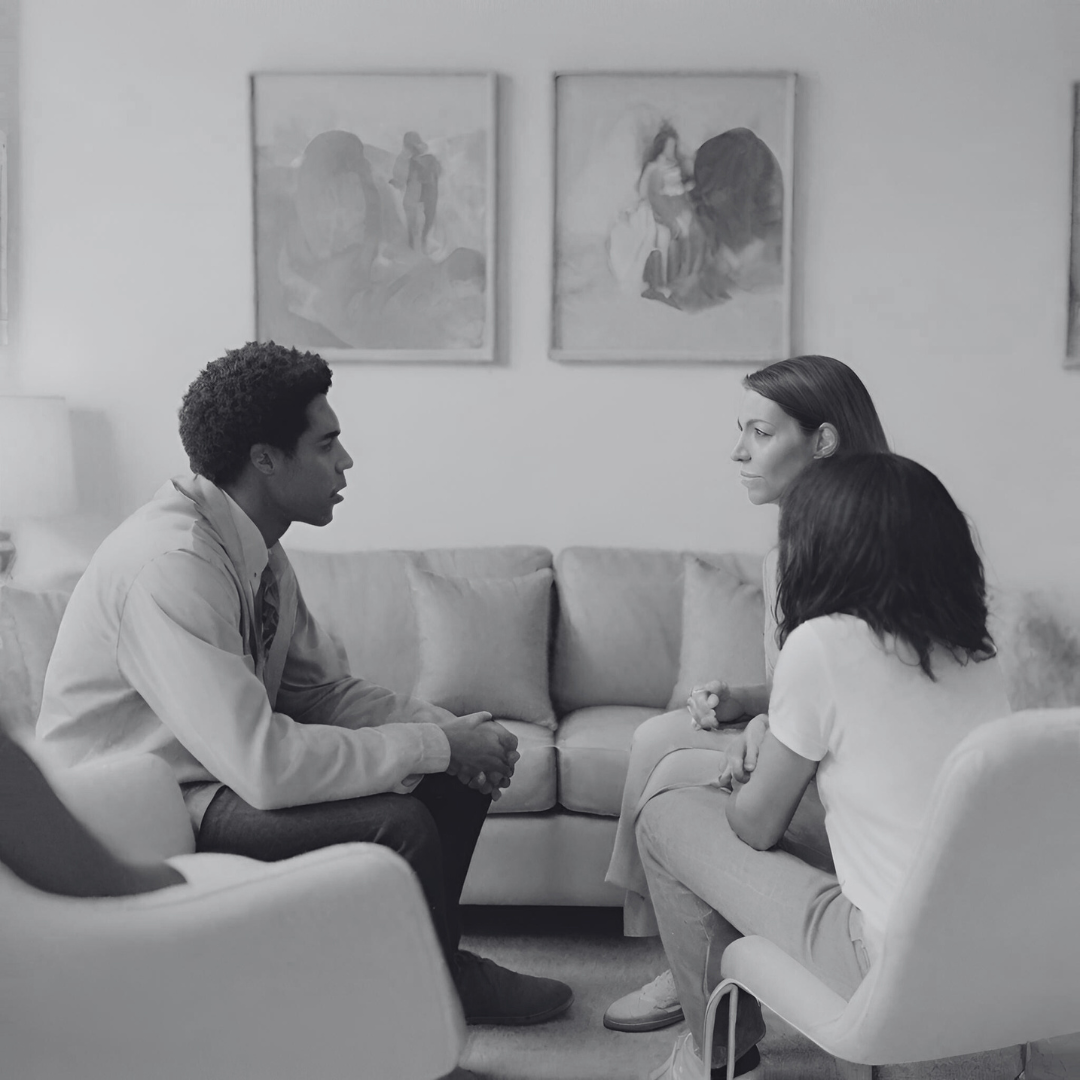Commonly Asked Question About Couples Therapy
Couples therapy has emerged as a beacon of hope for many, offering a path to improved communication, deeper understanding, and renewed connection. But what exactly is couples therapy, and how does it differ from couples counseling? Let’s take a look into the meaning, goals, and types of couples therapy, debunking myths and highlighting its transformative potential for relationships at every stage.
What is the Meaning of Couples Therapy?
Couples therapy, also known as marital therapy or relationship counseling, is a type of psychotherapy aimed at helping partners understand each other better, resolve conflicts, and improve their relationship satisfaction. Through guided discussions and therapeutic interventions, couples learn to communicate more effectively, negotiate differences, and express their feelings and needs in healthier ways.
What is the Main Goal of Couples Therapy?
The primary objective of couples therapy is to fortify the foundation of a relationship, offering couples a pathway to not only navigate through their current issues but also to build a resilient and fulfilling partnership for the future. Therapy focuses on:
Improving Communication: Teaching partners how to listen actively and express themselves clearly to foster understanding and empathy.
Enhancing Emotional Connection: Deepening the emotional bond between partners by encouraging vulnerability and sharing, which can reignite feelings of love and closeness.
Resolving Conflicts: Providing strategies and tools to address and resolve conflicts in a healthy manner, turning disagreements into opportunities for growth.
Addressing Specific Issues: Whether it’s dealing with infidelity, navigating financial disagreements, or overcoming differences in parenting styles, therapy is tailored to tackle the unique challenges of each couple.
Building a More Fulfilling Partnership: Aiming beyond resolving immediate issues, therapy supports couples in creating a partnership that is rich in mutual respect, love, and joy.
By concentrating on these key areas, couples therapy serves as a comprehensive approach to not only mend but also enrich relationships, guiding couples towards a more harmonious and satisfying life together.
What’s the difference Between Couples Therapy and Couples Counseling?
Although the terms "couples therapy" and "couples counseling" are frequently used as if they were interchangeable, they actually refer to two distinct types of support that cater to different aspects of a relationship. Understanding these differences can help couples choose the approach that best suits their needs.
Couples Therapy
Purpose: Couples therapy is designed for long-term improvement and deep healing. It aims to address the root causes of emotional and psychological issues within the relationship.
Focus: This form of therapy goes beyond surface-level problems, exploring the underlying patterns and dynamics that contribute to the couple's challenges. It often involves exploring each partner's background, beliefs, and behaviors and how these influence the relationship.
Duration: Typically, couples therapy is a longer process, which allows for comprehensive exploration and profound changes. Sessions may continue for several months or even years, depending on the couple's needs and progress.
Couples Counseling
Purpose: Couples counseling is generally more short-term and focused on resolving immediate, specific conflicts or decisions. It's aimed at couples who are looking to improve particular aspects of their relationship rather than overhaul it entirely.
Focus: The primary goal is to provide couples with the tools and strategies they need to tackle current disputes or make decisions about a specific issue. It's more about practical solutions and less about deep emotional healing.
Duration: Counseling sessions are typically fewer in number, with many couples finding resolution or improvement within a few weeks or months.
Comparing the Two:
Depth of Intervention: Therapy provides a deep, introspective look into personal and mutual patterns, while counseling focuses on resolving specific issues with practical strategies.
Time Commitment: Therapy requires a longer commitment to fully address and heal underlying issues, whereas counseling may offer quicker solutions to immediate problems.
Outcome Goals: The goal of therapy is to fundamentally transform the relationship dynamic and foster long-term emotional connection, while counseling aims to resolve conflicts and improve decision-making processes.
Understanding these distinctions can empower couples to make informed decisions about which approach might best address their current relationship challenges.
What are some Disadvantages of Couples Therapy?
Couples therapy is a powerful tool for relationship improvement but comes with its own set of challenges. It's essential for couples to be aware of these potential drawbacks:
Time Investment: Therapy requires regular sessions over months or even years, demanding a considerable time commitment from both partners.
Financial Costs: Professional therapy sessions can be expensive, and not all insurance plans offer coverage for couples therapy. However, many therapists provide sliding scale fees or online options to help manage costs.
Emotional Effort: Engaging in therapy can be emotionally demanding, as it often involves discussing painful topics and confronting personal issues.
Realistic Expectations: Progress in therapy can be gradual, and not every session will feel like a breakthrough. It's important for couples to maintain realistic expectations and remain committed to the process.
Despite these challenges, the benefits of therapy—such as improved communication, deeper emotional connection, and effective conflict resolution—often outweigh the drawbacks. By understanding and preparing for these challenges, couples can navigate the therapy process more effectively and work towards a healthier, more fulfilling relationship.
Is Couples Therapy the End of a Relationship?
Contrary to the myth, couples therapy is not a last resort but a proactive step toward strengthening relationships. It reflects a couple's commitment to growth and problem-solving, rather than surrender.
Many couples have turned their relationships around through therapy, overcoming communication issues, and deepening their connection. These stories illustrate therapy's potential to transform relationships, providing the tools for understanding, support, and renewed commitment.
Therapy offers a chance for couples to grow together, enhancing communication and emotional bonds. Far from signaling an end, it marks a new beginning of understanding and intimacy.
Embracing therapy can lead to a stronger, healthier partnership, proving it's a hopeful journey, not a sign of failure.
What are the Most Effective Types of Couples Therapy?
Couples therapy offers various approaches tailored to meet different relationship needs. Here, we highlight three widely recognized methods, each backed by research and expert endorsements.
Emotionally Focused Therapy (EFT)
Focus: EFT centers on building and enhancing emotional attachment between partners. It helps couples understand their emotional responses and create stronger bonds.
Evidence: Studies, such as those by Dr. Sue Johnson, the creator of EFT, show significant improvements in couples' intimacy and communication post-therapy.
The Gottman Method
Focus: Developed by Drs. John and Julie Gottman, this method emphasizes conflict management, fostering respect, affection, and closeness. It's known for its practical, research-based strategies for improving relationship quality.
Evidence: The Gottman Institute cites over 40 years of research, demonstrating the method's effectiveness in enhancing relationship satisfaction.
Cognitive Behavioral Therapy (CBT)
Focus: CBT for couples focuses on identifying and changing negative communication patterns and behaviors, aiming to improve the way partners interact with each other.
Evidence: Research indicates that CBT can significantly reduce relationship distress, as highlighted in studies published in the Journal of Marital and Family Therapy.
What are the Stages of Couples Counseling?
Couples counseling typically unfolds in stages, from establishing therapeutic goals to working through conflicts and developing strategies for maintaining improvements. Understanding these stages can help couples set expectations and commit to the process.
Initial Assessment: Identify relationship issues and set a counseling plan.
Setting Goals: Determine desired outcomes from counseling.
Resolving Conflicts: Learn and apply new communication skills to address unresolved issues.
Improvement Strategies: Implement practical steps to strengthen the relationship.
Maintenance: Periodic sessions to sustain progress and tackle new challenges.
Should Healthy Couples Go to Therapy?
Preventive therapy can be beneficial for healthy couples, helping to fortify their relationship against future stressors and deepen their connection. It's a proactive approach to relationship maintenance.
Strengthens Relationships: By addressing potential issues early, couples can strengthen their resilience against future challenges.
Deepens Connections: Engaging in therapy helps deepen emotional intimacy and understanding between partners.
Research indicates that couples who engage in preventive therapy report higher satisfaction levels and are better equipped to handle stressors, with a significant percentage demonstrating improved communication skills and relationship quality over time.
Preventive therapy is not just for relationships in distress; it's a strategic investment in a relationship's long-term health and happiness.
Should Husband and Wife See the Same Therapist?
Seeing the same therapist can offer insights into the relationship dynamics, but it's crucial that the therapist remains neutral and respects each partner's confidentiality. Deciding if couples should see the same therapist involves weighing the advantages and challenges:
Advantages
Holistic Insight: One therapist understands both sides, aiding in targeted advice.
Session Efficiency: Tackles both perspectives in one setting, potentially speeding up progress.
Challenges
Privacy Concerns: Sharing personal issues in joint sessions might inhibit openness.
Perceived Bias: The risk of one partner feeling the therapist is biased, affecting trust.
Considerations
Couples need to assess their comfort with shared sessions and the importance of unbiased support. Open discussion on these factors is key to making an informed choice.
Why is Couples Therapy So Hard?
Couples therapy can be a demanding process, requiring openness, honesty, and readiness to adapt. Here's why it's tough, along with expert advice and tips for making it easier:
Why It's Hard
Vulnerability: Sharing deep feelings and admitting faults can be daunting.
Change: Implementing new behaviors and communication styles requires effort and commitment.
Expert Advice
Embrace the Process: Experts like Dr. John Gottman suggest viewing therapy as a journey of growth, not just a fix for problems.
Communication is Key: Learning to express needs and listen actively can transform your relationship dynamics.
Tips for Success
Patience: Change takes time; be patient with yourself and your partner.
Support: Lean on each other outside of sessions to practice new skills.
When to Call It Quits in a Relationship?
Deciding to end a relationship is a profound and personal decision. Here are key signs that it might be time to consider parting ways, presented with sensitivity and an emphasis on seeking professional guidance:
Persistent Unhappiness: If the relationship consistently drains your happiness and you've tried unsuccessfully to address the issues.
Fundamental Differences: When core values and life goals diverge significantly, and compromise seems impossible.
Abuse: Any form of abuse—physical, emotional, or otherwise—is a clear signal that the relationship is not healthy.
Making the decision to end a relationship should not be done in isolation. Consulting with a therapist or counselor can provide clarity, support, and guidance during this challenging time.
Conclusion
Couples therapy offers a path to understanding, healing, and growth for relationships facing challenges. By embracing the process with openness and commitment, couples can uncover deeper connections and build a stronger, more resilient partnership.
Author
Meet the SBCS Team
At Space Between Counseling Services (SBCS), we're a team of diverse therapists passionate about enriching your mental health through insightful articles. Licensed across MD, NM, DE, and FL, we blend expertise in anxiety, depression, trauma, and more, striving for inclusivity in every piece we write.
Our collective voice aims to guide, educate, and support you through modern life's complexities.








